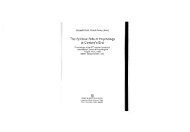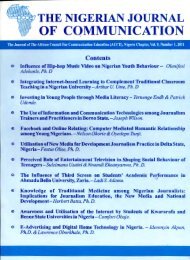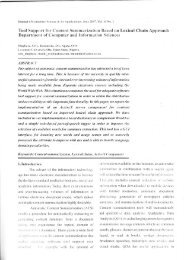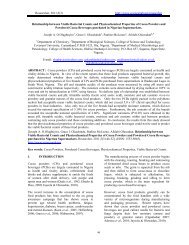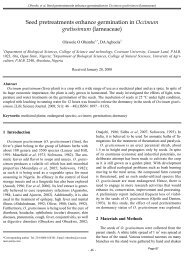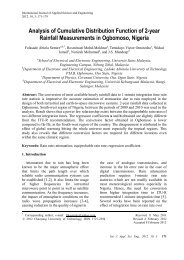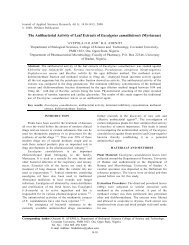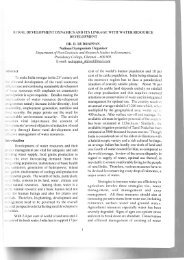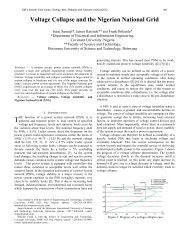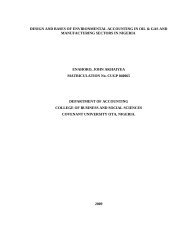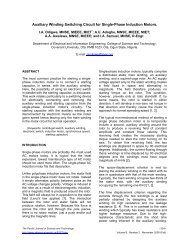Download (27Mb) - Covenant University Repository
Download (27Mb) - Covenant University Repository
Download (27Mb) - Covenant University Repository
You also want an ePaper? Increase the reach of your titles
YUMPU automatically turns print PDFs into web optimized ePapers that Google loves.
l[ $1ffi"<br />
IST-Africa 201 I Conference Proceedings<br />
Paul Cunningham and Miriam Cunningham (Eds)<br />
IIMC International Information Management Corporation, 20 1 I<br />
/,sB/* 97g- I -905924-24-3<br />
Challenges of E-Government in African<br />
Countries: Creating an E,nabling<br />
Environment in Nigeria<br />
Rudrappan DHAMODHARAMT, Amerjothy SAtrztrl.trAtHAN2<br />
1 <strong>Covenant</strong> (Jniversity, Ota, Ogin Siate, Nigeria<br />
Tel: +234 808 056 3744, Email: rudrappsn_d@,redi.fmail.com<br />
2 Presidency College, Cniii'i,f t"an<br />
Tel: +91 9444 62 38 60, Email: s,,,pme4othv@yahooco.in<br />
Abstract: E-government refers to the govemment's use of ICT tools particularly<br />
web-based internet applications to enhance the access to and delivery of govemment<br />
information and service to citizens, businesses and arms of govemment. Egovemance<br />
has emerged as a viable means to address development issues and<br />
challenges because citizens find empowerment through access to information.<br />
Emerging developing economies such as Republic of Kore4 Singapore, and<br />
Malaysia have embarked upon e-govemment initiatives so as to provide a just, fair<br />
and equitable governance environment to the governed and they have achieved<br />
tremendous success also. However, African countries particularly Western African<br />
nations namely Nigeria has lagged far behind. In addition to presenting the concept<br />
and an outline of e -governance, the paper compares implementation of egovernment<br />
in top ranking developing countries with that of African countries,<br />
particularly Nigeria with the aim of developing a road map for the speedy<br />
implementation of e-govemment in Nigeria.<br />
Keywords: E-government, ICT tools, Web-site, lntemet, Telecommunication,<br />
Broadband, Online services, Portal.<br />
1. Introduction<br />
To be educated is to be able to reado write and use the computer -New paradigm<br />
Following the above paradigm, new ICT tools have been introduced to make economic and<br />
social institutions more productive, enhance skills and learningo improve governance at all<br />
levels and make it easier for services to be accessed. The growth of Information and<br />
Communication Technology (ICT) is changing the way economic, social and political<br />
development takes place in African Countries. Therefore, the countries in Africa have<br />
started implementing e- government initiatives recently using the enormous potential of<br />
I.C.T tools and application for the distinct purpose of improving, enlarging and perfecting<br />
the governance process. E-government is the use of ICT to transform government by<br />
making it more accessible, effective and accountable.<br />
The major objective of e-government is to have SMART governance which means:<br />
Simple, Moral, Accountable, Responsive and Transparent governance. E-government is<br />
defined as one which is utilizing the internet and the worldwide web for delivering<br />
government information and services with an unconstrained and timely access to its<br />
citizens. [1] The World Bank refers to e-govemment as the use of information technologies<br />
such as networks, internet and mobile computing by government agencies that have the<br />
Copyright O 2011 The authors r,vr,r,rv.ISll -Attica.or g/Con rence?0 I l. Page I of8<br />
I<br />
ex6:. ...
ability to transform relations with citizens, businesses and other forms of govemment. [2]<br />
Internet and telephone access and penetration are some of the ICT tools used not only for<br />
societal gains but also for faster economic development and better governance. However,<br />
according to International Telecommunication Union of UN, intemet penetration level has<br />
reached 70Yo in North America as against a low level of 5% in Africa. Realizing this, many<br />
developing countries such as Republic of Korea, Singapore, and Malaysia have embarked<br />
upon using ICT initiatives for better governance and have been ranked very high in the E-<br />
Government Development Index value prepared by the United Nations since 2002. Similar<br />
to advanced nations, whose citizens enjoy the benefits of abundant resources, superior<br />
access to information and a more participatory relationship with their governmenti, the<br />
above top ranking developing countries have become models to be emulated by other<br />
African countries that are lagging behind in e-government initiatives. The problem that is<br />
addressed in this paper is to make a comparative study of top ranking developing countries<br />
with that of African countries, more particularly Nigerian e-government initiatives with a<br />
view to offer remedial measures and applicable framework for laying the foundation for<br />
improving e-governance in Nigeria leading to all round development.<br />
2. Objectives<br />
Several basic factors must exist such as financial resources, computer literate human<br />
capital, power and telecommunication infrastructure and above all political will and strong<br />
commitment of national leadership to maximize e-government's effectiveness and to realize<br />
its vast potential. The absence of the above in Nigeria has led to the formulation of<br />
following objectives:<br />
1. To find out the challenges impeding an enabling e-government environment in African<br />
countries, particularly Nigeria.<br />
2. To examine the core features that are responsible for the successful implementation of<br />
e-government initiatives among the top ranking e- government developing countries and<br />
to apply them as a model for a better e-governance environment in Nigeria.<br />
3. Methodology and Conceptual Framework<br />
Descriptive Analysis has been used comprising tables and averages to highlight the<br />
favourable features of top ranking countries and shortcomings of Nigeria in terms of egovernment<br />
index value. The panel data has been collated from the United Nations E-<br />
Government Surveys.<br />
Several authors have referred to stages of growth models for fully functional and<br />
effective e- govemment. This type of growth model based principle has dominated the<br />
theoretical framework used in e-government research papers. [3] Gil-Garcia has pointed out<br />
seven stages of e-government growth from evolutionary stage to fully integrated presence<br />
of vertical and horizontal integration cutting across boundaries. [4] Further, Elmagarmid<br />
also has highlighted that there are four phases of development such as one-way<br />
communication, two-way, complex and final integration across all government processes.<br />
[5] However, Watson and Mundy have observed that there exists three distinct phases such<br />
as initiation, infusion and customization. [6] However, United Nations Survey on E-<br />
Government,2002listed five phases of comprehensive growth such as emerging, enhanced,<br />
interactive, transactional and fully integrated presence. The survey further pointed out that<br />
several African countries such as Nigeria, Ghana, Kenya and Zambia have remained in the<br />
second stage while top ranking emerging economies such as Korea and Singapore have<br />
reached the top stage. [7] Though Culbertson [8] has argued that technological forces are<br />
the major propellers of e-governance, Zakareya t9] has attributed e-governance<br />
development mainly to organizational and environmental drivers. United Nations has<br />
Copyright O 201 I The authors lvvvrv. I S I -r\ttica.ot q/Ccxr lbrenceZ0 I I Page 2 of 8<br />
\.
emphasized that an efficient e-government necessitates application of ICT tools by the<br />
government to transform its internal and external relationships. [10]<br />
4. U.N Survey 20022 E-Government among the World Countries<br />
In the last two decadeso both internet and worldwide web have added a new and<br />
indispensable 'e-govemance' to academia, commerce and now to the governance of the<br />
country intended to enhance government's efficiency and administrative operations.<br />
Consequently, the performance levels of e-governance of the countries around the world<br />
have been identified.<br />
Advanced nations whose citizens enjoy the benefits of abundant resources, superior<br />
access to information and a more participatory relationship with their governments, rank<br />
well above the mean e-govemment global index of 1.62 prepned by UN to benchmark egovernance<br />
and to assess the progress of U.N member states since 2002. United Nations egovernment<br />
index 2002 has classified the world countries into four groups on the basis of egovernment<br />
initiatives such as high, medium, low and deficient e-government groups.<br />
Many African countries have been classified in the deficient group where emerging<br />
presence of e-government has been witnessed with less than 1.00 development index value.<br />
4.1 W Survey 2010: Top Ranking E-Government Developing Countries<br />
The United Nations E-Government Survey, 2010 has observed that citizens are benefitting<br />
from more and improved interaction with governments, primarily as a result of enhanced<br />
use by the Government of ICT. High income countries enjoy top rankings as a result of<br />
advanced e-service delivery, better access to information, more efficient government<br />
management in the e -government development index. The top three are (1) The Republic<br />
of Korea with a score of 0.8785 followed bV Q) USA with 0.8510 and (3) Canada with<br />
0.8448. The survey pointed out that the world average stood at 0.4406 and Asia remains<br />
almost at the world average with0.4424 and Africa with0.2733.<br />
Table lr{o: I. Top Ranking Developing Countries<br />
Rank Country E-government<br />
World e-government<br />
Development Index Value Development Ranking<br />
2010 2008 2010 2008<br />
1 Republic of<br />
Korea<br />
0.878s 0.83 17 I 6<br />
2 Singapore 0.7 47 6 0.7009 11 23<br />
6 Malaysia 0.6101 0.5 819 32 34<br />
World Average 0.4406 a.4514<br />
Source: United Nations E-Govemment Development Index Survey.2Ol0<br />
From the above Table: 1, it is inferred that the top ranking developing countries in egovemment<br />
development index such as Korea, Singapore and Malaysia with a world rank<br />
of 1,1 I and 32 respectively have invested heavily in online services and ministry portals<br />
and websites to offer more services and to engage citizens actively in dialogue with the<br />
respective government. This has led to the gradual elimination of the digital divide in<br />
Malaysia, Republic of Korea and Singapore who have become world leaders in egovernment<br />
as a result of integration of back-office operations and provision of e-services<br />
to their citizens in a seamless manner.<br />
Republic of Korea: The Republic of Korea's national portal is exceptional in its design<br />
and provision of features to its citizens. It is an integrated system of allowing citizens easy<br />
Copyright e 20ll The authors r,vr,vrv.I S'l -A tiica. or g/Ccxr lerence?0 I I Page 3 of 8
access to government information and contains features for mobile alerts, forms,<br />
hansactions and online consultation services *ith th" ;;;;iiment by name e-people. The<br />
aim of e-people is to improve transparency of go-vernment administration, improve<br />
;lfrlji:lr. reporting and engase citizens tn.o.,gi petitions, proposars and poticy<br />
singapore: Singapore's.national portal has an organized and effective online approach to<br />
providing information to its users tilrough portals uid rni"ro-rites. citizens and residents are<br />
directed to E-citizen, an-e-servi""r poiul'thut l""t"r"! ;h; il.sonatireo single sign-onsite<br />
for payment services and mobile ,"*i"r*- with a mobil" pinrt "tion rate of 136 percent,<br />
mobile services delivery is a strategic initiative or singapoi".^ci,ir"n, and business houses<br />
have expressed high level of satisfa-ction and er{oy td;;u;n;nce of accessing more than<br />
300 public services through mobile technology.<br />
Malaysia: Malaysia's sMS system enables users to receive information on demand,<br />
documents on demand, ranging from emergency notification to basic notifications. The<br />
system allows users to prwide compraints to government departments.<br />
u'N' survey athibuted the dismal perfonianc" orani"ir lountries to non-availability<br />
of capital for developing e-government basic initiatives such as building of<br />
telecommunication' onlini sirvice-and education ror ".*tin!'i favorable environment for<br />
citizen empowennent to narrow the current digital gap.<br />
4.2 Low Ranking E-Government in African Countries<br />
Among African countries, Tunisia stands frgt in e-governance followed by Mauritius and<br />
Egypt' The western African region scored loweJt in 2010 survey due to inadequate<br />
financial resources' low human gapacity and inadequut" trr".ormunication infrastructure.<br />
In this region, cape verde tops the tlst wittr 0.4054ioilo*"Jly cote d,Ivoire with 0.2g05,<br />
Ghana with 0.27 54 and Nigeria with 0.26g7 .<br />
Table No 4: Poor performance of serected African Countries in E-Government Index 20r0<br />
SAI World Rank Countries Index<br />
value<br />
sourc( UN. E-Governm ent Surv ey,2010<br />
Online<br />
service<br />
comnonenf<br />
1 tt7 Botswana 43637 0.0680<br />
2 147 Ghana 0.27 54 0 0s07 n n10<<br />
v.V tJrt<br />
3 150 lltrigeria 0.2697 0.0324 0 0194<br />
4 Continent Africa 0.2733 0.0489 0.0221<br />
Africa<br />
of which<br />
Telecommunication<br />
infrastructure<br />
development<br />
o o?s7<br />
Human<br />
capital<br />
component<br />
0.2601<br />
m nn1ln<br />
w.L LV I<br />
u203s<br />
The dismal performance of some selected countries is shown in the above table no: 4.<br />
As against the worrd lv:rage e-government deveropment index varue of 0.4406,<br />
Botswana's performance is impressiie with an index uui.'r" oi 0.3637 when compared to<br />
insignificant performance of west African.Nations such as Nigeria with 0.26g,7 and Ghana<br />
with 0'2754' Africa as a whole lagged far behind wttn o.ilii?s against the world average<br />
of 0'4406'Though the developmen=t-of human capital component with a value of 0.2167 is<br />
significant, Nigeria has not faied well in the devejoprnrnt 6f t"t"communications and in the<br />
provision of online services to its citizens. online services a"iiiiuting e- governance are far<br />
better in Botswana and Ghana when compared to deficient functioning in Nigeria.<br />
Copyright O Z0ll The authors<br />
Page 4 of8
5. ICT in Nigeria<br />
Some countries in Africa including Nigeria do not possess prominent and fully functional<br />
national portal or ministry website for finance, education, health, labor and other serviies.<br />
The development process of e-government in Nigeria has been impeded as a result of<br />
institutional weakness, insufficient planning, and inadequate systems design and lack of<br />
human capital. Many ICT projects remain unfulfilled due to under estimated costs and lack<br />
of recurring expenditure. Nigeria has no real e-services and it does not provide citizens with<br />
transactional opportunities. World Information Society Report 2007 of ITU has pointed out<br />
that none of the African countries is found in the top l00.rankings; with Nigeria occupying<br />
141't position and Democratic Republic of Congo ai 183'd level. Similarly,ITU tras pointeO<br />
out that in2007, internet penetration i.e., intemet users per 100 inhabitants has reached a<br />
mere 5.9Yo in Nigeria as against 60% in Malaysia. One of the key determinants of internet<br />
penetration is the cost of web access. According to the World Bank, the cost of accessing<br />
the internet in India was 8.7 US dollars, while for Nigeria, it was put at $85.5 and for<br />
Uganda it was $96.8. In view of the high cost, internet penetration remains low in Nigeria.<br />
To strengthen funher and to face the immense challenges in ICT in Nigeria, the World<br />
Bank offered $2million invesfnent on facilities to promote growth and investment in ICT<br />
projects with the belief that the development of ICT in Nigeria would enhance the<br />
enorrnous potential of employment, income, growth and development. How ever, it has not<br />
resulted in success. Even former Minister of Information and Communications, Prof. Dora<br />
Akunyili identified capacity building as the main challenge of ICT and the paramount focus<br />
of the Federal Government lies in promoting it towards enhancing career progression and<br />
development for a better quality of life that would have multiplication effects on the<br />
nation's economy.<br />
6. Lessons Learnt for Creating an Enabling Environment in Nigeria<br />
Indeed, Nigeria is developing in the area of ICT for good governance but there are still<br />
some major loopholes which are affecting its total advancement. Considering the<br />
impressive performance of top ranking emerging developing economies such as Republic<br />
of Korea, Singapore and Malaysia, Nigeria has a long way to go in the context of prevailing<br />
factors such as limited access to economic and social infrastructure, inadequate and costly<br />
internet, fixed and mobile telephony services and poor broadband service penetration.<br />
Development of ICT tools is imperative which not only strengthens e-govemment but also<br />
brings forth, the next new wave of fast growth as witnessed in emerging Asian economies.<br />
ICT tools facilitate smooth governance in many ways in Nigeria. Institution and adoption of<br />
electronic voting system as is done now in Nigeria will ensure credible elections removing<br />
electoral malpractices. Land registration, tax register, personnel management database,<br />
pension register and contract tender registers could be carried out electronically, thereby<br />
ensuring transparency and accountability. Online service will also help to reduce reckless<br />
government spending, open and quite corruption, besides saving cost and time of all<br />
stakeholders. The World Bank Report pointed out that employment growth in developing<br />
countries remains at 4.5% for the enterprises that do not use ICT tools; and 5.6Yo growth for<br />
enterprises that use ICT tools. Thus, the use of ICT tools has resulted in better growth, job<br />
creation, business profitability and labour productivity not only in business enterprises but<br />
also in education, health and agriculture.<br />
The national information infrastructure - Singapore ONE (One Network for Everyone),<br />
the first nationwide broadband network in the world has reached nearly 100% of<br />
households in Singapore and similar network for everyone could be tried in Nigeria also.<br />
The possibility of applying ICT tools to governance is not new to Nigeria. Since 2000, the<br />
government has approved an ICT policy under the auspices of which National Information<br />
Copyright O 20ll The authors r,vvvrv.IS I-;\liica.or g/Ccxrlbrenoo?O I I Page 5 of 8
Technology Development Agency (NITDA) was established. However, it was not<br />
implemented with a strategic time frame and the leaders have not realized that egovernment<br />
will bring transformation from a disconnected self-centric gorre*ment to a<br />
connected citizen-centric govemment, from. isolated delivery of servicesl an integrated<br />
delivery of services plou-tdt:tg a single point of interaction and affording all the stake<br />
holders the freedom of choic-, convEnience and control. The absence of the above has<br />
resulted in bureaucratic practices of red-tapism, favoritism, nepotism resulting in inefficient<br />
and corrupt administrative and political system.<br />
7. Benefits of ICT to Nigeria<br />
An e-government initiative encompasses all sectors and facilitates all round development of<br />
the economy by opening up its market within Nigeria and with other countries. By ensuring<br />
a fair, just and equitable society, e-governmenl _ensures a participatory democracy and<br />
formulation of public policy in the gov-emance of the .o*try. it promotes globalization and<br />
integration of the economy with the world economy unJ in" global financial market<br />
facilitates flow of the much desired foreign capital ror gen"rating higher outpu! income,<br />
quality mass education, employment, savi-ngs, investm"it, tt "r"u! u""""ntuutiig rJuction<br />
of poverty and inequality in income and wealth. ln adiition to ensuring mass quality<br />
education, e-literacy, and e-commerce such as _online rrtopping ano uair.ing int *""<br />
employment opportunities as well. E-government facilitates uriogilg the digitaiiiroiae and<br />
more.importantly sensitization of the public on the n..d io-protect public utilities which<br />
remain as sources of welfare for the poor. As a powerful tool'for human d"r;i6;;"t, it is<br />
essential for the achievement of the internationaily agreed development goals including the<br />
Millennium Development Goals. of late, Nigerians tuu" ,eutir"o lts traisrormative power<br />
in revitalizing public administration, overha-uling public .*ug"-"nt, fostering inclusive<br />
leadership and moving civil service towards high;r iin"i"rr"). -<br />
Gender - inclusive approacfrel to public.sJrvice delivery is possible and e-government<br />
could be effectively leveraged for women's. economic ritpo...-ent and employment<br />
during the crisis' E-health, a ptocess of administering health ".are, Trl".edicine; a process<br />
of accessing health care frorna distance through ICftools and M-health; the use of mobile<br />
phones for getting health services are the "r"rging uses of ICi in health care that could be<br />
used easily by the government. The benefits ireio .*y-rurrr u, easy communication,<br />
enhanced transparency, accountability, increased opporturiry; ;;"i"r"'tr;il;;;;""i ir.n<br />
participation, democratic enrichment,- superior gou.-*";l-Jitir"n-"rntric cost-effective<br />
services, long term economic growth, opporn niry-to "nhance gou"*un.. through improved<br />
access to accurate and transparent information. Ii provid., uu"iu", to improve Jff""ti'u.rr"r,<br />
of-global competitiveness, grofih of technorogy, ,";i.; a"iiu".y, socio_economic and<br />
political stability of the country. [11]<br />
8. RecommendationsandConclusions<br />
Nigeria needs committed political will and-sgong_ leadership to bring forward necessary<br />
changes in e- govemment as stated below. Mass flliteracy uia th" high cost of accessing<br />
computers and the internet are the main factors that impede rapid gro*ih of ICT in-Nig.riu.<br />
ICT driven payroll system and pension system has hiped th! gon"--ent to save money<br />
and the electronic payment has solved the problem'oi -uri"r-roll scandal and ghost<br />
workers' These laudable changes from cash ..ono-y to "u.tti"r, economy in the form of<br />
electronic transaction should be introduced in all oiher financial transactions which will<br />
make them easier to audit public funds and track the ;.igi"r and destinations of each<br />
transaction. Besides, this also helps to fight money launderiniand financial crimes.<br />
Copyright @ 201I The authors<br />
Page 6 of8
The first priority of the Government is to build computer communication networks all<br />
over the county which will establish connectivity across all departments. Once the<br />
networks are established, integrated information systems have to be implemented in all the<br />
ministries and they have to be updated regularly. To increase internet penetration, the<br />
present scheme of Computer for All Nigerians Initiative (CAND should be fully<br />
implemented for improving the ownership of personal computers. The provision of mobile<br />
connections should be made cheaper like Malaysia so that connections are augmented<br />
further from the present 61.5 million telecommunication lines as on January 2011,<br />
providing an opportunity to democratize access to intemet technology. There should be a<br />
commitrnent to implement an E-Nigeria Programme, with an initial goal of online<br />
publications within 5 years.<br />
At present in Nigeria, for ICT programme implementation, there are three autonomous<br />
bodies. For better co-ordination, there is a paramount need to entrust it to a single body,<br />
namely NIDTA. ICT programme should include civil service computerization plan for<br />
computerizing major functions in every government department, plan for the development<br />
of the local IT industry and a pool of IT manpower to meet the future needs of the counfiy.<br />
Effective operational computerization programme with bulk acquisition of computer<br />
equipments and provision of computer training for all is a must. All institutions should<br />
impart computer literacy education for all students. Electronic publication of all documents<br />
by federal, state and local governments should be carried out and all websites be constantly<br />
updated. Electronic publishing of documents and digital signatures are not admissible as<br />
evidences in the court of law. For this purpose, an Electronic Transaction Act on the model<br />
of Australia should be enacted in Nigeria also with liberal provision of funding for breaking<br />
the existing legal barriers.<br />
Public Libraries which have been established all over the country could become easily<br />
de facto e-government access points provided they are funded to equip themselves with<br />
necessary infrastructure. Just like Ethiopia where local Amharic language script has been<br />
digitalized, Nigeria should also develop its local scripts for digital use for its masses.<br />
Capacity building in socio-economic infrastructure particularly in telecommunication,<br />
online services, power and human capital is recommended. Tax rebate to the ICT products<br />
is one of the measures to bring down the price so as to popularize its use among the public<br />
and subsidy on roll out cost to rural areas as well as tax incentives could be used to promote<br />
e-government services patronage. Following the example of other African countries such as<br />
Botswana and South Afric4 Nigeria could also establish a collaborative frame work to<br />
partner with European Commission to promote ICT initiatives through research capacity<br />
building. In order to achieve all the functions of ICT, the following basic facilities have to<br />
be provided with liberal funding: provision of uninterrupted power supply, of sufficient<br />
infrastructure for ensuring easy and cheap access to broadband and internet. Nigeria should<br />
be interconnected by broadband fibre-optic cable systems or satellite communications that<br />
will link them to the rest of the world at a cheaper cost'<br />
Thus, the paper has highlighted the features responsible for the high performance of<br />
developing economies such as Republic of Korea, Singapore, and Malaysia and suggested<br />
them as models and remedial measures for better e-governance in Nigeria. It is summarized<br />
that e-govemment seems to be a new and emerging phenomenon and for the most part, a<br />
nascent activity for African nations. In view of the enortnous benefits of e-governments, it<br />
is imperative for African countries to overcome barriers listed above such as inadequate<br />
human capital, info structure and infrastructure for a fully functional e-govemment. Further,<br />
it is suggested that the government needs to identifi' and co-ordinate opportunities for<br />
collaboration across all departments and monitor the progress made periodically.<br />
The paper has concluded that good governance remains as the ultimate objective of all<br />
governments, and e-government has emerged as a viable means to achieve it through<br />
Copyright O 2011 The authors r,vvvrv.I ST-Aliioa.or g/Con lerence?0 l l Page 7 of8
seamless flow and access to information. However, the benefits of e-government will<br />
continue to elude Nigeria and all other African countries if the obstacles for favorable egovernment<br />
initiatives are not addressed adequately and immediately. The government is<br />
yet to realize that ICT could be a driving force to the desired socio-economic development<br />
and have not paid much attention to its development. Much work has to be done to bridge<br />
the digital divide in order to make National governance programme workable, economically<br />
sustained, efficient and safe. The country cannot move ahead unless e-government is<br />
rigorously implemented. The need of the hour is to follow an old Japanese proverb which<br />
advocates; exploit the inevitable, and that is e-government.<br />
References<br />
[] United Nations (UN) 2002, Benchmarking e-govemment- a global perspective: Assessing the progress in<br />
UN member states.http://unpanl.un.org/introdoc/groups/public/documents/. Accessed on 22 November,20l0.<br />
[2] World Bank, 2007. E-government. http://rveb.worldbank.org/. Accessed on 24 November, 2010.<br />
[3](Iteeks, R,2004. E-govemment for development: Basic definitions. http:/iwww.eqovdev.orgy'egov.de{h.htm.<br />
Accessed October 20, 2010.)<br />
[4] Gil-Garcia, R.J & Martinez- Moyamo 1.J.2007. Understanding the evolution of e-government: The<br />
influence of systems of rules on public sector dynamics. Govemment lnformation Quarterly, 24(2):266-290.<br />
[5] Elmagarmid, A.K. & Mclven, W.J 2001. The ongoing match towards digital government, IEEE<br />
computers, 34 (2): 32-38.<br />
[6] Watson, R.T & Mundy,8.2001. A strategic perspective of electronic democracy, Communication of the<br />
ACM,44(l):27-30<br />
.[7] United Nations (l-lN) 2002, Benchmarking e-govemment- a global perspective: Assessing the progress in<br />
IJN memberstates.http://umpanl .un.org/introdoc/groups/public/documents/. Accessed 20 November, 2010.<br />
.[8] Culbertson, S. 2004. Building e-govemment: organizational and cultural change in pu.blic administration<br />
in Glover, E.L. and Sanders, L. (Eds), E-government reconsidered. Renewal of govemance for the knowledge<br />
age, Canadian Plains Research Center, 59-75.<br />
l9l Zakareya E. Zahir, I.U Al Sarmad, S.2004. Factors influencing adoption of e-govemment in the public<br />
sector. Paper presented at the European and Mediterranean Conference on Information Systems, 25-27 July,<br />
Tunis, Tunisia.<br />
[0] United Nations(UN). 2003. World Public Sector Report- 2003: E-government at the cross roads. UN<br />
Dept. of Economic and Social Affairs, New York,<br />
http://umpanl.un.ore/infodoc/grouos/publip/documents/un/. Accessed 23 November, 2010<br />
Il] Devanathan, G.K. 2008 "Biometric smart card" Information Technology for developing countries - A<br />
news letter ofthe Center for Electronic Govemance, Indian Institute of Management. P.46<br />
Copyright @ 20ll The authors r,vr,r;rv.I ST-A tiica.or g/Con lbrenoc20 I I Page 8 of 8<br />
\<br />
I



